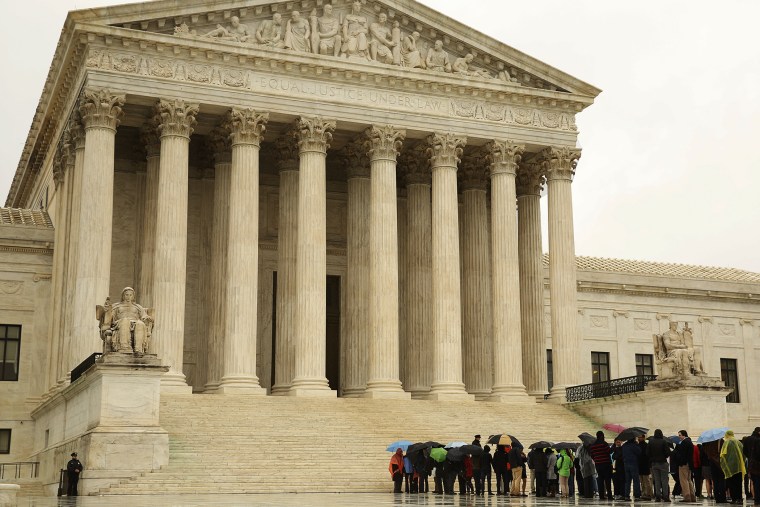Presidential recess appointments aren't just a common practice; they're a power specifically given to presidents in the Constitution. Article II, Section 2 reads, "The President shall have Power to fill up all Vacancies that may happen during the Recess of the Senate, by granting Commissions which shall expire at the End of their next Session."
In practice, however, the use of this power is trickier than it might seem.
A few years ago, President Obama nominated some qualified officials to serve on the National Labor Relations Board, only to have Senate Republicans block their confirmation votes. When lawmakers left town, the White House said the Congress was in recess, and gave the officials temporary recess appointments. Republicans balked -- they weren't really in recess, they said; they only looked like they were in recess because they'd stopped working for a few days.
Today, the Supreme Court sided with Congress in a unanimous ruling, though the decision didn't go quite as far as some lawmakers had hoped. Adam Serwer explained:
President Obama's attempt to make appointments to the National Labor Relations Board while the Senate was still technically in session was unconstitutional, the Supreme Court ruled Thursday. The decision, which was unanimous in judgment, preserves the recess appointment power much as it was prior to Obama's confrontation with Congress three years ago.
Writing for the court, Justice Stephen Breyer explained, "We hold that, for purposes of the Recess Appointments Clause, the Senate is in session when it says it is, provided that, under its own rules, it retains the capacity to transact Senate business."
Many presidents have gone to extraordinary lengths when trying to apply their recess-appointment power -- in a famous story, Teddy Roosevelt once appointed officials when the Senate took a lunch break -- but it didn't literally become a federal case until Republicans freaked out over Obama's use.
Today's ruling, which is online in its entirety here (pdf), brings clarity to the constitutional language. But did the justices make the right call?
Revisiting our coverage from months prior, much of the controversy boils down to a couple of letters of constitutional text. Presidents have the authority to make recess appointments "during the recess of the Senate." Note that it says, “the recess,” not “a recess.”
Why does the distinction matter? In the early days of the country, framers saw recesses that could last months and wanted presidents to be able to fill key positions temporarily in emergency situations without the Senate’s consent. There’s generally a lengthy break following the final adjournment for the legislative session, and this is generally considered “the recess.” The provision was not about giving presidents the authority to circumvent Congress when the White House felt like it.
With this in mind, I think the unanimous court is right and Obama was wrong. Putting aside the policy particulars, it’s not up to the executive branch to decide when the legislative branch is legitimately in session and when it’s not. If Congress says, “Technically, we’re in session,” there’s no reason to think a president has the authority to respond, “I’ve decided you’re not.”
The contextual circumstances mattered far more before the so-called "nuclear option" -- if a Senate minority could block all nominees with majority support and prevent presidents from exercising their recess-appointment power, it would undermine the government's ability to function. But with Senate Democrats restoring majority rule to the nominating process, this matters a lot less. At least for now, Obama doesn't need recess appointments -- he just needs a Democratic Senate.
Experts will need to spend some additional time with today's ruling, but the larger takeaway is that Obama pushed his luck, but the power itself remains intact. If the Senate is in recess, a president can make permissible recess appointments.
As for the NLRB, keep an eye on the policy impact: every decision the board made with its recess-appointed members is now invalid.
